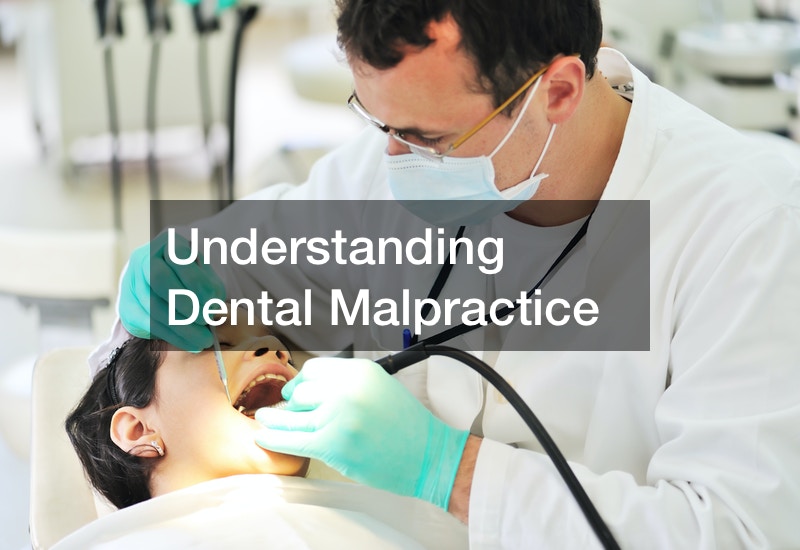
Your dental professionals should provide you with a high level of quality care that minimizes your suffering and manages common oral health issues. Unfortunately, negligence and improper care may trigger grief that may require a medical malpractice case to manage and assess properly.
Therefore, it is vital to fully understand the nature of dental malpractice and what you can do to get help. Understanding your legal rights will make it simpler to reach out to a lawyer and ask for assistance. It will also ensure that you get the compensation that you deserve for your pain.
Understanding Dental Malpractice
Dental malpractice occurs when something goes wrong with your dental care that negatively affects your health. This problem goes beyond a simple mistake, such as a tool cutting your gums as your dental expert works. Instead, malpractice occurs if your dental professional was negligent and caused an injury that triggered severe pain and suffering in your life as a person.
Negligence is a tricky term to define in a medical case. It indicates when your practitioner did not provide a proper level of care that a reasonable expert at their level should have provided. Or it can mean a failure to diagnose a health problem that most dental experts should have noticed. We’ll go over more examples of specific case types but will define a few broader standards here:
- Failure to Diagnose – If your dental professional somehow misses something like a potential infection in your mouth and does not treat it, you could end up experiencing pain and suffering. This case falls under malpractice if it causes enough pain in your life.
- Failure to Treat – Similarly, if your dental professionals do not treat a problem correctly, they likely committed malpractice. For instance, pulling the wrong tooth out of your mouth is considered malpractice because it was unnecessary, painful, and could affect your oral health.
- Failure to Advise – If your cosmetic dentistry professional fails to advise you properly, this could be malpractice. For instance, if they do not tell you of less invasive and painful procedures that could have worked just as well as surgery, some malpractice may have occurred.
These problematic situations all fall under the likely heading of malpractice. However, there is much more to malpractice than negligence. While negligence does serve as the centering point for this problematic and painful scenario, other legal factors must be addressed and proven before you can pursue a lawsuit or get compensation of any kind for your injury.
So if you’ve suffered at the hands of cosmetic dermatology services and aren’t sure of your rights, it is crucial to take a look at the factors that must be proven before you can pursue a dental malpractice case. These factors are common to all malpractice cases, so keep them in mind if you ever need to manage other health issues caused by negligence from a healthcare provider.
Types of Malpractice Injuries

Now that you understand the basics behind malpractice, it is crucial to understand what kind of injuries fall under this heading. Unfortunately, many people try to work with an accident attorney on this process only to find that their suffering does not qualify. This frustration can be very hard to tolerate and may require you to get help from a professional who fully understands your case and its unique and troubling complications.
Thankfully, working with an accident injury lawyer can help you increase your chances of winning a lawsuit. But before you attempt to pursue any dental malpractice suit, you must assess your injuries and understand whether it is worth trying to get compensation. For example, just a few types of damage that might qualify for a malpractice lawsuit include the following common dental treatment complications that you may experience:
- Problems With Anesthesia – When your dental expert does not correctly put you under during surgery, and you experience pain, you may get compensation. Likewise, they may also give you too much anesthesia and cause other health issues, including potential damage to organs and the brain.
- Poor Extraction Attempts – Removing your tooth is more complex than just tugging on it as hard as possible. Your dental professional must give you anesthesia to minimize your pain and take steps to avoid damaging your jaw or other teeth. If they fail to do so, they’ve committed malpractice.
- Sterilization Failures – When your dental expert does not properly sterilize their equipment, they can cause infections in your mouth that may be pretty painful. And you can usually get compensation for this sad mistake if you can prove it occurred in a malpractice suit.
- Surgical Mistakes – Dental surgery requires care and patience, and if your dental professional does not carefully manage their procedures, you could end up suffering. Some mistakes may even lead to permanent disfigurement or death – and an expensive malpractice lawsuit.
What kind of compensation can you get for your pain? Most people will earn money based on different factors. You must prove that you qualify for all of these compensation types by proving that your dental injury caused them. With the help of a lawyer, you should be able to easily handle this process. Just a few of the most common types of compensation types include:
- Pain and suffering caused by any of the mistakes made above, such as weeks of oral agony
- Loss of money caused by paying for other treatments or dental care procedures to fix the mistake
- Diminished quality of life caused by the malpractice, such as a struggle to eat properly
- Lost wages caused by missing work to get other types of treatment or due to dental pain
You need to work directly with your lawyer to fully prove that you experienced this kind of financial loss and deserve compensation. But, just as importantly, you need to fully understand the different factors of your case before you attempt to hire a lawyer to help you with your claim of this type.
Factors That Prove Negligence in a Malpractice Lawsuit
Whether you worked with a cosmetic dentistry professional or a standard dentist, it is essential to know what factors influence your dental malpractice suit. As mentioned previously, these elements are common to all malpractice suits. However, they differ slightly based on different medical fields, meaning that it is vital to consider each issue seriously.
When adequately proven, you improve your chance of winning your malpractice case and create a stronger and more air-tight case against your dental experts. Often, this situation can be hard to handle because your dental expert may have various lawyers whom they may use to attack your claims and minimize the impact of the four points necessary for negligence. These include four aspects:
- A Doctor-Patient Relationship – This concept may seem basic at its core. It states that a relationship existed between you and your dental professional, meaning that they were providing care for you. Though essential, you must show that you had this relationship to pursue a lawsuit.
- Poor Quality Dental Care – Now, you need to prove that your dental professional provided care that was below a traditional standard. For instance, if your dentist drilled and capped the wrong tooth, they provided substandard care by making a mistake that they should not have made.
- The Care Caused Injuries – If your dental expert did not harm you when providing substandard care, you do not have a malpractice lawsuit. Instead, you must prove that their poor treatment did hurt you, such as causing unnecessary pain when you received a treatment that you just didn’t need.
- Actual Harm Occurred – You must also prove that your injuries caused real harm or pain in your life. For example, if you can prove that you missed work due to your injuries or needed other surgeries to fix the error, you typically have a more substantial chance of winning your case.
If you cannot prove any of these elements in your case, you are likely to lose. For example, if you suffered substandard care that didn’t cause any injuries, you may not get any compensation. Or, if you cannot prove that your injuries were triggered by substandard care, you may lose as well. This situation is more complex than it might seem on the surface and requires you to do a lot of careful preparation to increase your chances of success.
Therefore, it is essential to know what kind of legal help you can get in this case. By working directly with a lawyer, you enhance your chances of winning and giving yourself the best opportunity to earn compensation. Though your lawyer will get a small portion of your winnings if you do succeed, the chance of getting a majority of that money is more than worth it for most people.
Why a Lawyer is So Important

If you’re ready to pursue a malpractice case based on your dental treatment, it is critical to talk to a lawyer to get the best chance of winning. Trying to pursue a case of this type yourself is only going to fail. While you can always defend yourself or prosecute a lawsuit without legal help, you’re more likely to lose without using a skilled expert.
Just what will a lawyer do in your case to increase your chances of winning? They’ll take over every step of your lawsuit and provide a careful and focused approach that increases your chances of winning. They’ll also do what they can to make your case stick by taking several detailed preparation steps. Just a few ways that your lawyer will help make your lawsuit more effectively include how they:
- Research Your Case – A high-quality attorney will carefully research and investigate your case to provide you with the high-quality help needed to minimize your struggle. They’ll take care of all of the challenging elements, such as talking to your dentist and other medical professionals about your pain.
- Discuss Your Rights – While researching your case, your lawyer will also talk to you about your rights and the options available to you. For example, they may state that a settlement is better with your orthodontists office because of the unique circumstances surrounding your case.
- Process and Prepare Paperwork – Setting up a lawsuit is a complex process, and you’ll need a lawyer to handle it. These professionals will process all of your paperwork and make sure that it is as up-to-date as possible. Doing so helps to keep your case legal and focused as it progresses.
- Find Evidence to Support You – Your lawyer will examine all of the evidence around your case, including testimony from others, various pictures of your oral health, and much more. They’ll also talk to legal experts who understand negligence to ensure that your claim qualifies.
- Pursue Your Case in Court – After taking care of all of the challenging preparation steps necessary for your case, your legal team will present your claim in court. They’ll do what they can to attack the defense’s statements and help to show that negligence occurred in your case.
In essence, a lawyer will create a legal case that is hard to argue against and which will help improve your chances of winning. In addition, they’ll take the time to work directly with you on this case, paying attention to your needs as a person. Most lawyers are skilled at reading the needs of their clients and will do what they can to minimize the emotional impact your struggle may have on you.

As you can see, it is crucial to take your time when going through this process to ensure that you finish it as correctly as possible. You need to work with a lawyer to trust to handle all of these steps and satisfy your needs. In this way, you can ensure that you don’t end up with a case that you cannot win or struggle to understand your rights as a person in a malpractice case.



